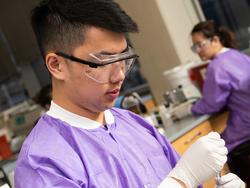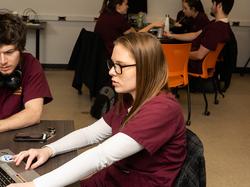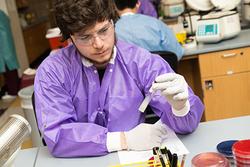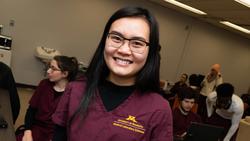Teaching team-based care to improve patient health
Our Curriculum
Our academic curriculum is built to prepare students for the essential role that Medical Laboratory Scientists play in providing health care teams with the vital information they need to monitor patients’ overall health, as well as diagnose, treat and manage their illnesses.
Interprofessional collaborative practices and education are the cornerstone of the program curriculum, promoting team-based care. Students learn how to work meaningfully, directly and efficiently with all members of a patient’s care team in a variety of environments, ensuring that “the right test on the right person at the right time” is ordered.
The MLS program regularly innovates and validates the selection and content of our curriculum, based on the latest educational research and needs of the profession.
Recognizing best practices for adult learning, we developed an innovative curriculum, which includes the optimal combination of state-of-the-art classrooms and laboratories, active learning student engagement, laboratory simulations, and online learning. Providing recorded lectures online enables our students to access them as often as they wish for study and review.
Clinical Education
During the final semester of the University of Minnesota’s MLS program, each student completes four three-week rotations in each of the major areas of Medical Laboratory Sciences, including:
- Hematology/ Hemostasis
- Chemistry/ Urinalysis
- Transfusion Medicine
- Microbiology
During this clinical experience, students are assigned to at least two different clinical sites or systems to gain experience in both rural and urban settings, and to experience how different laboratories operate based on their patient population, location, and services offered. Additionally, students are enrolled in the program’s Laboratory Management course to help them gain a deeper understanding of laboratory operations.
The clinical experience semester is vital to our students’ success in the field of medical laboratory sciences because it connects classroom theory and learning to the clinical laboratory, which bridges the gap from being a student to becoming a professional.
The hands on experience students will receive in a variety of clinical laboratory settings this semester exposes them to areas that are not reproducible within the classroom and laboratory, such as prioritizing, workflow, instrumentation, and collaborating with others both inside and outside of the clinical laboratory.
Clinical Education Affiliates
The MLS Program is tremendously grateful to our many clinical education affiliates. Each of these institutions provides an essential piece of the degree program for our students: direct education experience in laboratory practice. This component of their education allows students to apply what they have learned on campus to a real world environment and prepares them for the workplace in the near future.
Current Clinical Affiliate Sites
Allina Health System
- Abbott NW Hospital Central Laboratory | Minneapolis, MN
- Buffalo Hospital | Buffalo, MN
- Cambridge Medical Center | Cambridge, MN
- Coon Rapids Clinic | Coon Rapids, MN
- District One | Faribault, MN
- Mercy Hospital | Coon Rapids, MN
- New Ulm Medical Center | New Ulm, MN
- Owatonna Hospital | Owatonna, MN
- St. Francis Hospital | Shakopee, MN
- United Hospital | St. Paul, MN
- Unity Hospital | Fridley, MN
- WestHealth | Plymouth, MN
CentraCare Health
- Paynesville Clinic | Paynesville, MN
- St. Cloud Hospital | St. Cloud, MN
Essentia Health
- St. Joseph's Medical Center | Brainerd, MN
- St. Mary's Medical Center | Duluth, MN
M Health Fairview Systems
- Fairview Lakes Medical Center | Wyoming, MN
- Fairview Maple Grove Clinic | Maple Grove, MN
- Fairview Northland Medical Center | Princeton, MN
- Fairview Range Medical Center | Hibbing, MN
- Fairview Ridges Hospital | Burnsville, MN
- Fairview Southdale Hospital | Edina, MN
- University of Minnesota Medical Center - East Bank Acute Care Lab | Minneapolis, MN
- University of Minnesota Medical Center - Infectious Disease Diagnostic Laboratory | Minneapolis, MN
- University of Minnesota Medical Center - West Bank | Minneapolis, MN
- HealthEast St. John's Hospital | Maplewood, MN
- HealthEast St. Joseph's Hospital | St. Paul, MN
- HealthEast Woodwinds Hospital | Woodbury, MN
HealthPartners
- Amery Regional Medical Center | Amery, WI
- Hudson Hospital/Clinic | Hudson, WI
- Lakeview Hospital | Stillwater, MN
- Park Nicollet Methodist Hospital | St. Louis Park, MN
- Regions Hospital | St. Paul, MN
- Westfields Hospital & Clinic | New Richmond, WI
Mayo Clinic Health System
- Eau Claire | Eau Claire, WI
- Mankato | Mankato, MN
Ridgeview Medical Center
- Ridgeview Medical Center | Waconia, MN
- Two Twelve Medical Center | Chaska, MN
Others
- Affiliated Community Medical Center | Willmar, MN
- Avera Marshall Regional Medical Center | Marshall, MN
- Innovative Blood Resources | St. Paul, MN
- Kanabec Hospital / First Light | Mora, MN
- Minneapolis VA Health Care System | Minneapolis, MN
- Minnesota Department of Health (MDH) | Twin Cities, MN
- North Memorial Medical Center | Robbinsdale, MN
- Northfield Hospital | Northfield, MN
- OneOme | Minneapolis, MN
- Rice Memorial Hospital - Carris Health | Willmar, MN
- St. Lukes Hospital - Wilderness Health | Duluth, MN
"I really like how they put a good balance of working in the lab, where you learn how to do specific actions, and then, in the lectures, you get more of the theories — the disease states."
"They do a very good job emphasizing you’re not just there to be the diagnosis side of things, you’re also part of the care team, and the actions you make in lab are going to benefit the patient."
"What I really like about it is that you get to make an important impact on patients and patient care, but you get to be behind the scenes. It was nice for me in that I get to help people, but I also get to do what I like to do, which is the more technical lab stuff."
"Besides doing lab work in class, the professors give us in-class lectures, especially in cases that can apply in whatever we learn in class to a real-life scenario. And that’s really helpful."



